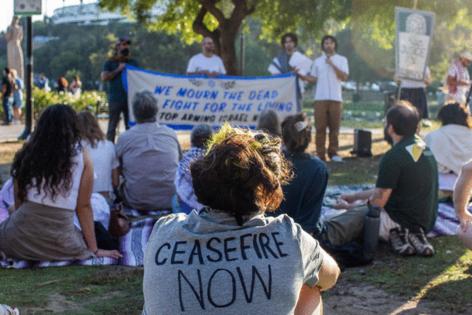Commentary: Why are we so obsessed with cease-fires?
Published in Op Eds
War is never a good thing, but as terrible as it is to say, sometimes it is necessary. It is understandable that once a war begins, the horror of human suffering that always comes with it leads many well-intentioned people to think that anything that might stop the fighting — even for a short time — is good. Wouldn’t a cease-fire help — as John Lennon would say — to “give peace a chance”?
Alas, this is not always the case.
Cease-fires can, under some circumstances, be useful. If both parties to a war are interested in peace and willing to compromise on issues in contention, then having a break in the carnage of war can definitely be a positive thing. It allows for a moment of calm when negotiations lead to a breakthrough and offer a chance for peace. And it also provides an opportunity for humanitarian aid to reach those who have been caught up in the war zone.
However, cease-fires work only if both parties are interested in achieving peace and are trustworthy. Cease-fires are based on the assumption that the parties in a war are rational actors and have found themselves in an unfortunate position and are looking for ways to back away from it. They depend on both parties abiding by the terms of the cease-fire.
Unfortunately, there are some people with whom one cannot negotiate. And as sad as it is, some are not honest. Some countries and some non-state actors want war and even welcome the suffering of the innocent. It is sometimes tricky for basically good people to grasp this. Their weakness is that they don’t understand that many people are nothing like them. They are good human beings but fundamentally naïve in the face of evil. The people most likely to call for cease-fires amid conflict do not understand those who have no interest in peace.
Consider terrorist organizations like Hezbollah and Hamas. For them, cease-fires are held in contempt. They do not want to reason with their enemy. They are not interested in compromise. And they are not honest. These are sad facts, but they are facts nonetheless. Cease-fires are, at best, only tactical for them — an opportunity to regain strength and rearm after suffering a setback.
Hezbollah’s 1985 manifesto makes it clear that its attacks on Israel are not just about defending themselves against perceived Israeli aggression. It calls for the complete annihilation of Israel and pledges loyalty to Iran’s supreme leader, which is why it is designated by the United States and many other countries as a terrorist organization. Its goal is not peace under any circumstances or conditions with Israel. The Hamas Manifesto of 1988 clearly states, “Initiatives, and so-called peaceful solutions and international conferences, are in contradiction to the principles of the Islamic Resistance Movement.” Their goal is to eliminate not only Israel but Jews everywhere.
For groups like these and some countries, there is no interest in a peaceful solution to a conflict. They want the conflict. Their goal is the complete destruction of their perceived enemy. Nothing less is acceptable. So, when President Joe Biden called recently for a cease-fire between Hezbollah and Israel in Lebanon and the Australian prime minister called for restraint “on both sides,” they are revealing a fundamental misunderstanding of the nature of the conflict. They believe that a pause in the conflict is always a good thing, but there is no interest in peace for Hezbollah or Hamas.
During World War II, Winston Churchill understood the threat of Nazism better than anyone. He knew one could not compromise with Adolf Hitler, which is why he said that nothing but “unconditional surrender” to the evil of Nazism was acceptable. Peace was the goal, but making deals with evil actors was folly.
In 2020, the United States agreed, in the hope that it would facilitate peace, to a cease-fire with al-Qaeda, Osama bin Laden’s terrorist group that was responsible for the attacks on us on 9/11. As we began to withdraw our troops, al-Qaeda issued a statement that “war against the U.S. will be continuing on all fronts.” The cease-fire did not lead to peace.
Our obsession with cease-fires is easy to understand. We want peace, but we are horrified by war. However, genuine peace is only possible when both parties in a conflict want it. A pause in the conflict will not make progress possible. As sad as it is, sometimes we have no alternative but, in Hamlet’s words, to “take up arms against a sea of troubles and by opposing end them.”
_____
Solomon D. Stevens is the author of “Religion, Politics, and the Law” (co-authored with Peter Schotten) and “Challenges to Peace in the Middle East.” He wrote this for InsideSources.com.
_____
©2024 Tribune Content Agency, LLC.




























































Comments